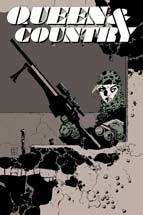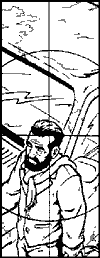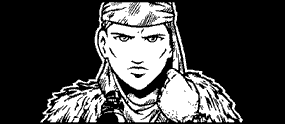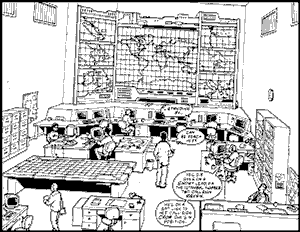|
"Greg Rucka interview"
APR 2001 Product
Click on graphics to view a larger version.
|
 Greg Rucka is the writer of several novels
featuring professional bodyguard Atticus Kodiak, the co-writer of Marvelís Black
Widow: Breakdown, the current writer of DCís Detective
Comics, and the creator/writer of Oni Pressí Whiteout. His new series, Queen
& Country, debuts this month from Oni. Worlds
of Westfield Content Editor Roger Ash recently spoke with
Greg about Queen & Country. Greg Rucka is the writer of several novels
featuring professional bodyguard Atticus Kodiak, the co-writer of Marvelís Black
Widow: Breakdown, the current writer of DCís Detective
Comics, and the creator/writer of Oni Pressí Whiteout. His new series, Queen
& Country, debuts this month from Oni. Worlds
of Westfield Content Editor Roger Ash recently spoke with
Greg about Queen & Country.
|
Westfield:
What can you tell us about Queen
& Country?
Greg Rucka:
Itís an ongoing spy series featuring a British secret agent who was first
introduced in Whiteout. The series is kind of like James Bond injected with a
healthy dose of realism. Thatís it in a nutshell.
Westfield:
Do you think this series compares to Whiteout,
and will people need to be familiar with Tara Chaceís previous appearance?
Rucka:
Theyíre very different and people wonít need to be familiar with her
appearance there at all.
Westfield:
What can you tell us about whatís coming up in the series?
 Rucka:
In the first issue, Tara commits an assassination by like page 7, and then has
to spend the rest of the issue getting out of the country. The second, third and
fourth issues all deal with the ramifications of what happened in issue 1. One
of the things that I wanted to do was, instead of just having spies running
around and shooting people, I wanted to show that if you shoot a person,
thereís serious repercussions. Licensed to kill or not, thereís serious
repercussions to the action. Queen
& Country is not a dumb read. This is not, dare I say it, like
picking up the latest issue of X-fill-in-the-blank, and you get 22 pages of fist
fights and some hyperbolic character development. Weíve got a large cast of
characters that are introduced in a very quick sense. Everything is there.
Weíre not going to cheat the reader, but you gotta pay attention or else
youíre gonna be lost, and youíre gonna miss the boat, and then youíre
gonna get cranky, and then youíre gonna yell at me, and youíre gonna say
itís my fault when, in point of fact, it isnít. It was all there to begin
with. [laughter] Itís true. We were thinking of actually publishing a little
guide in the back of the first issue. Weíve been talking about what weíre
going to do with the extra page or two there, and I wanted to write an intro
anyway, a ďthis is why Iím doing this projectĒ sort of thing, then we were
going to get artist Steve Rolston to do head shots of like 20 people so youíd
be able to know whoís who. But hopefully it will be clear. Rucka:
In the first issue, Tara commits an assassination by like page 7, and then has
to spend the rest of the issue getting out of the country. The second, third and
fourth issues all deal with the ramifications of what happened in issue 1. One
of the things that I wanted to do was, instead of just having spies running
around and shooting people, I wanted to show that if you shoot a person,
thereís serious repercussions. Licensed to kill or not, thereís serious
repercussions to the action. Queen
& Country is not a dumb read. This is not, dare I say it, like
picking up the latest issue of X-fill-in-the-blank, and you get 22 pages of fist
fights and some hyperbolic character development. Weíve got a large cast of
characters that are introduced in a very quick sense. Everything is there.
Weíre not going to cheat the reader, but you gotta pay attention or else
youíre gonna be lost, and youíre gonna miss the boat, and then youíre
gonna get cranky, and then youíre gonna yell at me, and youíre gonna say
itís my fault when, in point of fact, it isnít. It was all there to begin
with. [laughter] Itís true. We were thinking of actually publishing a little
guide in the back of the first issue. Weíve been talking about what weíre
going to do with the extra page or two there, and I wanted to write an intro
anyway, a ďthis is why Iím doing this projectĒ sort of thing, then we were
going to get artist Steve Rolston to do head shots of like 20 people so youíd
be able to know whoís who. But hopefully it will be clear.
Westfield:
Do you have any storylines planned past the first one?
Rucka: Past
the first four issues, I do, but theyíre far more tentative. One of the things
I want to do is draw the stories from what Iím reading in the papers so Iím
trying to keep it fairly topical in that sense. For example, the first thing
that happens in the second issue really happened. I took this event that looks
ridiculous out of a newspaper. So consequently, I have ideas for things I want
to do, but Iím not pushing it yet because I want to see whatís happening in
the world. Things are changing very quickly and for this to have any sense of
realism, itís got to be pertinent at the time it comes out. Ireland and the UK
are getting along right now. If, in 6 months theyíre fighting again, that
changes the issue. Weíre trying to be somewhat on the ball.
Steve Rolston, the guy
whoís drawing the first four issues, is a newcomer and heís wonderfully
talented. Itís a very different look from what Lieber did in Whiteout. Theyíre both
very good at what they do. Steve Rolstonís is a very open, really
hyper-iconic, almost cartoony, style that works surprisingly well given the
realistic nature of what weíre doing. I think people are going to be really
impressed with him.
Westfield:
Do you have any artists lined up for upcoming story arcs?
Rucka:
Steve Lieber has expressed interest in doing an arc. Rick Burchett has expressed
interest. Darick Robertson. Matthew Clark. There are a fair amount actually. One
of the things, from an artistic standpoint, that I wanted to do was be able to
work with different artists so I could see what happens when I work with them.
Westfield:
You mentioned that there are a lot of characters in the book. Who are some of
the characters?
 Rucka:
Youíve got Tara, whoís our lead, who readers of Whiteout would know as
Lily, but thatís not her real name because she was on assignment in
Antarctica. Why would she give anybody her real name if she were working as a
spy? Thatís the reason why sheís not named Lily. You canít believe how
many people have said, ďyouíve changed her name!Ē I didnít change her
name. She never gave her real name. Trust me. So thereís Tara. Sheís part of
a three-person unit in the British secret service of special operation officers.
Theyíre the ones who run and jump and shoot and dive. All 998 other people in
the ministry are the ones who sit there with the intelligence, and do the
briefings and read and analyze, but itís these three who run around and do the
ridiculous stuff. Thereís Tara, thereís the guy whoís her head of section,
Tom Wallace, thereís another guy whoís the third person in the section,
sheís the middle, the third person in the section is a guy named Edward
Kittering. They are directly ordered, or tasked, by the Director of Operations,
Paul Crocker. Rucka:
Youíve got Tara, whoís our lead, who readers of Whiteout would know as
Lily, but thatís not her real name because she was on assignment in
Antarctica. Why would she give anybody her real name if she were working as a
spy? Thatís the reason why sheís not named Lily. You canít believe how
many people have said, ďyouíve changed her name!Ē I didnít change her
name. She never gave her real name. Trust me. So thereís Tara. Sheís part of
a three-person unit in the British secret service of special operation officers.
Theyíre the ones who run and jump and shoot and dive. All 998 other people in
the ministry are the ones who sit there with the intelligence, and do the
briefings and read and analyze, but itís these three who run around and do the
ridiculous stuff. Thereís Tara, thereís the guy whoís her head of section,
Tom Wallace, thereís another guy whoís the third person in the section,
sheís the middle, the third person in the section is a guy named Edward
Kittering. They are directly ordered, or tasked, by the Director of Operations,
Paul Crocker.
Thereís a tree to it. The Director of Operations has an opposite number
in the same organization, which is the Director of Intelligence. Theyíre of
equal rank. Above both of them is the Deputy Chief of the Service, Donald
Wheldon, heís a jerk. Soís Crocker. Tara and Tom and Ed are basically the
nice people, everybody else is just obsessive compulsive. Above the Deputy Chief
is the Head of the Service, C. I donít know how many names that is and
thatís not even half of the characters. A lot of the names donít really
matter. Thereís a lot of action that takes place in the operations room, which
is the great big scary room where people wander around looking at monitors
waiting for things to happen. There are lots of people that are staffed in
there, all of them have been named, but their names are only relevant to the
story when it comes up.
Westfield:
With this series and Whiteout and Black
Widow: Breakdown, youíve been dealing a lot with spies and espionage.
Is that an interest of yours?
Rucka:
Itís a passion. I love spy stories. Queen
& Country, and Iíve said this several times and Iím gonna be
saying it again and again, is a rip off. Queen
& Country is based on a British television series called The
Sandbaggers that ran around Ď79, Ď80 and Ď81 for a total of 20
episodes on Yorkshire Television. It was about the special operations division
of SIS. The nickname they used for the agents was Sandbaggers, so youíd have
Sandbagger 1, Sandbagger 2 and Sandbagger 3. Weíre not doing that. Let me tell
you, itís hard to come up with a good nickname. [laughs] I loved that show.
That show was the best espionage Iíd ever seen because it was exciting, but it
was realistic. It wasnít the James Bond stuff. You got to see the political
ramifications and the political process to  lead
to every espionage situation and to me, thatís fascinating stuff. And itís
fairly intelligent stuff. Itís very exciting and compelling to begin with, but
it requires an effort the part of the reader and the audience. You have to pay
attention to it. Itís the difference between reading a Mack Bolan novel and
reading a John LeCarre novel. Theyíre both books, but Mack Bolan is ďwith
three deadly shots of cordite from his 45, the bad guy fell.Ē With LeCarre,
itís sections about, ďterrified, he set down the microfilm.Ē [laughs] Oh,
scary. Microfilm [laughter] But itís part of the process. Thereís an
emotional thing that gets overlooked in the Bond stuff. Itís only recently
come back in the movies, in fact. This is hard work. This is scary work. Itís
stuff where people are pretty much putting their life and liberty at risk daily.
They get paid very poorly. They get treated very poorly. Think about it in terms
of a scenario such as this; intelligence knows that a terrorist group is
planning to kidnap a scientist so they can make a bomb so they can blow up
something, something that may be directed at you, by the way. So your boss wants
to send you to investigate it, but his boss says that you canít because the
budget wonít allow it. See what I mean? Thereís a totally different tension
there that you never see, but thatís a legitimate tension. It isnít as
simple as ďIím going to run and jump and drink Dom Perigon.Ē Itís like,
ďyou know what? Thereís a Congressional Oversight Committee that says we
canít do this anymore.Ē Thereís a real drama if that is counterpointed to
having Tara in Kosovo, having just put a bullet through a guyís head, running
for her life. While sheís running for her life, her bosses are arguing about
whether or not they can afford her funeral if she dies. lead
to every espionage situation and to me, thatís fascinating stuff. And itís
fairly intelligent stuff. Itís very exciting and compelling to begin with, but
it requires an effort the part of the reader and the audience. You have to pay
attention to it. Itís the difference between reading a Mack Bolan novel and
reading a John LeCarre novel. Theyíre both books, but Mack Bolan is ďwith
three deadly shots of cordite from his 45, the bad guy fell.Ē With LeCarre,
itís sections about, ďterrified, he set down the microfilm.Ē [laughs] Oh,
scary. Microfilm [laughter] But itís part of the process. Thereís an
emotional thing that gets overlooked in the Bond stuff. Itís only recently
come back in the movies, in fact. This is hard work. This is scary work. Itís
stuff where people are pretty much putting their life and liberty at risk daily.
They get paid very poorly. They get treated very poorly. Think about it in terms
of a scenario such as this; intelligence knows that a terrorist group is
planning to kidnap a scientist so they can make a bomb so they can blow up
something, something that may be directed at you, by the way. So your boss wants
to send you to investigate it, but his boss says that you canít because the
budget wonít allow it. See what I mean? Thereís a totally different tension
there that you never see, but thatís a legitimate tension. It isnít as
simple as ďIím going to run and jump and drink Dom Perigon.Ē Itís like,
ďyou know what? Thereís a Congressional Oversight Committee that says we
canít do this anymore.Ē Thereís a real drama if that is counterpointed to
having Tara in Kosovo, having just put a bullet through a guyís head, running
for her life. While sheís running for her life, her bosses are arguing about
whether or not they can afford her funeral if she dies.
Westfield:
Have you done a lot of research into espionage?
Rucka:
Yeah. Iím 31. Iíve been doing about 20 years worth of research. [laughter]
Westfield:
Will Carrie Stetko be appearing in the series or will we be seeing her in
another Whiteout
mini-series?
Rucka:
Thereís a potential for another Whiteout.
There will be a third and final Whiteout at some point. Carrieís not going to appear in this
simply because going to Antarctica once on a mission is unique. Going twice?
Thatís silly.
Westfield:
Are there any other projects youíre working on youíd like to mention?
Rucka:
There is a tentative Oni project that Iíll be doing with a guy named Nunzio
DeFilippis, itís a question of when. Thatís way off in the future. So
thereís something else with Oni thatís going to be in a different but
similar vein. It will be sort of a cat burglar story. Thereís Batman stuff. Officer Down is in January and itís going to be a really, really
good storyline. And there are some other projects, but nothing so pressing right
now that I think we should devote ink to it.
Westfield:
Any closing comments?
Rucka: Just
because itís black and white doesnít mean itís bad! [laughter]
|
|